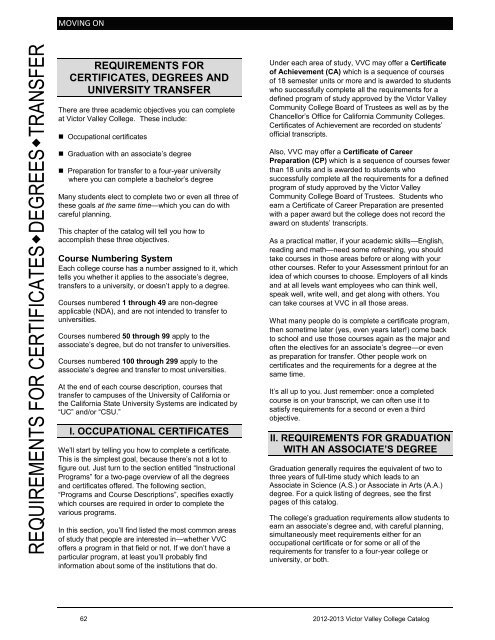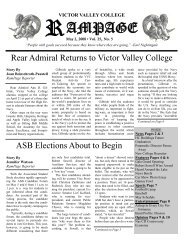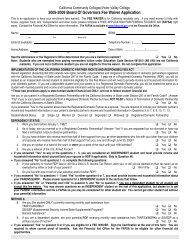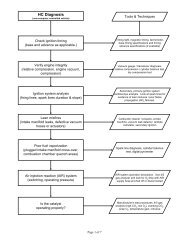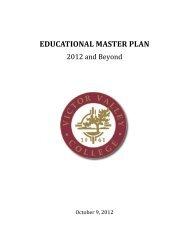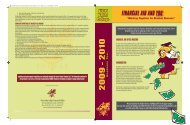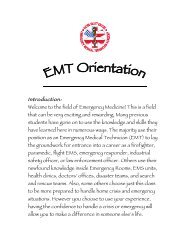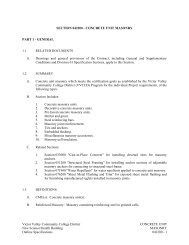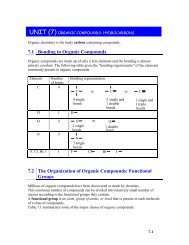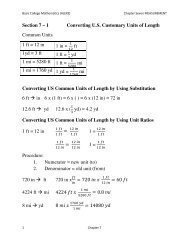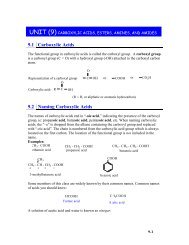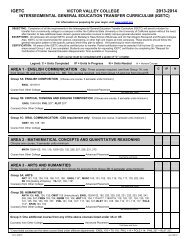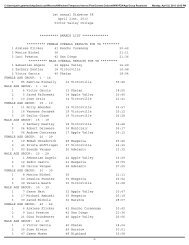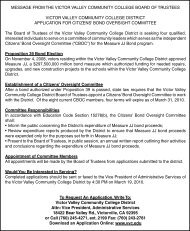Download - Victor Valley College
Download - Victor Valley College
Download - Victor Valley College
You also want an ePaper? Increase the reach of your titles
YUMPU automatically turns print PDFs into web optimized ePapers that Google loves.
MOVING ON<br />
REQUIREMENTS FOR CERTIFICATES•DEGREES•TRANSFER<br />
REQUIREMENTS FOR<br />
CERTIFICATES, DEGREES AND<br />
UNIVERSITY TRANSFER<br />
There are three academic objectives you can complete<br />
at <strong>Victor</strong> <strong>Valley</strong> <strong>College</strong>. These include:<br />
• Occupational certificates<br />
• Graduation with an associate’s degree<br />
• Preparation for transfer to a four-year university<br />
where you can complete a bachelor’s degree<br />
Many students elect to complete two or even all three of<br />
these goals at the same time—which you can do with<br />
careful planning.<br />
This chapter of the catalog will tell you how to<br />
accomplish these three objectives.<br />
Course Numbering System<br />
Each college course has a number assigned to it, which<br />
tells you whether it applies to the associate’s degree,<br />
transfers to a university, or doesn’t apply to a degree.<br />
Courses numbered 1 through 49 are non-degree<br />
applicable (NDA), and are not intended to transfer to<br />
universities.<br />
Courses numbered 50 through 99 apply to the<br />
associate’s degree, but do not transfer to universities.<br />
Courses numbered 100 through 299 apply to the<br />
associate’s degree and transfer to most universities.<br />
At the end of each course description, courses that<br />
transfer to campuses of the University of California or<br />
the California State University Systems are indicated by<br />
“UC” and/or “CSU.”<br />
I. OCCUPATIONAL CERTIFICATES<br />
We’ll start by telling you how to complete a certificate.<br />
This is the simplest goal, because there’s not a lot to<br />
figure out. Just turn to the section entitled “Instructional<br />
Programs” for a two-page overview of all the degrees<br />
and certificates offered. The following section,<br />
“Programs and Course Descriptions”, specifies exactly<br />
which courses are required in order to complete the<br />
various programs.<br />
In this section, you’ll find listed the most common areas<br />
of study that people are interested in—whether VVC<br />
offers a program in that field or not. If we don’t have a<br />
particular program, at least you’ll probably find<br />
information about some of the institutions that do.<br />
Under each area of study, VVC may offer a Certificate<br />
of Achievement (CA) which is a sequence of courses<br />
of 18 semester units or more and is awarded to students<br />
who successfully complete all the requirements for a<br />
defined program of study approved by the <strong>Victor</strong> <strong>Valley</strong><br />
Community <strong>College</strong> Board of Trustees as well as by the<br />
Chancellor’s Office for California Community <strong>College</strong>s.<br />
Certificates of Achievement are recorded on students’<br />
official transcripts.<br />
Also, VVC may offer a Certificate of Career<br />
Preparation (CP) which is a sequence of courses fewer<br />
than 18 units and is awarded to students who<br />
successfully complete all the requirements for a defined<br />
program of study approved by the <strong>Victor</strong> <strong>Valley</strong><br />
Community <strong>College</strong> Board of Trustees. Students who<br />
earn a Certificate of Career Preparation are presented<br />
with a paper award but the college does not record the<br />
award on students’ transcripts.<br />
As a practical matter, if your academic skills—English,<br />
reading and math—need some refreshing, you should<br />
take courses in those areas before or along with your<br />
other courses. Refer to your Assessment printout for an<br />
idea of which courses to choose. Employers of all kinds<br />
and at all levels want employees who can think well,<br />
speak well, write well, and get along with others. You<br />
can take courses at VVC in all those areas.<br />
What many people do is complete a certificate program,<br />
then sometime later (yes, even years later!) come back<br />
to school and use those courses again as the major and<br />
often the electives for an associate’s degree—or even<br />
as preparation for transfer. Other people work on<br />
certificates and the requirements for a degree at the<br />
same time.<br />
It’s all up to you. Just remember: once a completed<br />
course is on your transcript, we can often use it to<br />
satisfy requirements for a second or even a third<br />
objective.<br />
II. REQUIREMENTS FOR GRADUATION<br />
WITH AN ASSOCIATE’S DEGREE<br />
Graduation generally requires the equivalent of two to<br />
three years of full-time study which leads to an<br />
Associate in Science (A.S.) or Associate in Arts (A.A.)<br />
degree. For a quick listing of degrees, see the first<br />
pages of this catalog.<br />
The college’s graduation requirements allow students to<br />
earn an associate’s degree and, with careful planning,<br />
simultaneously meet requirements either for an<br />
occupational certificate or for some or all of the<br />
requirements for transfer to a four-year college or<br />
university, or both.<br />
62 2012-2013 <strong>Victor</strong> <strong>Valley</strong> <strong>College</strong> Catalog


